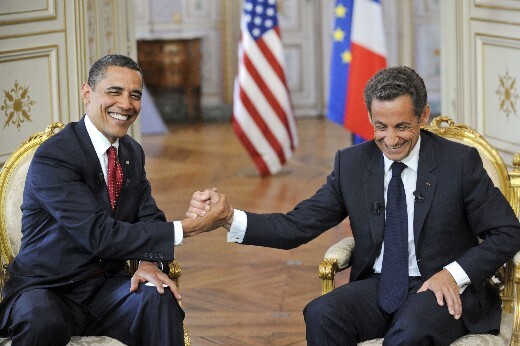hankyoreh
Links to other country sites 다른 나라 사이트 링크
Obama’s strong remarks toward N. Korea leaves room for dialogue

U.S. President Obama’s remarks on June 6 during his visit to France were strong. However, he did not venture beyond the line of “tough and direct dialogue” which he has drawn upon since his presidential election last year.
Analysts are focusing on two central components in his remarks. In particular, attention is on his mention that “North Korea’s actions over the last several months have been extraordinarily provocative” and his reference to United Nations Security Council (UNSC) preparations for a new resolution against North Korea’s actions. In the remarks, Obama reconfirmed what his administration has announced since its inauguration that “Provocation may cost something corresponding to their action.”
Analysts say his remarks demonstrate that the U.S. has a room for a diplomatic solution to the North Korea nuclear issue in spite of North Korea’s second nuclear test and preparation of a long-range missile launch. Furthermore, they suggest they indicate that the U.S. has not closed the door of dialogue even though U.S. Secretary of State Hillary Clinton has mentioned the possibility of imposing its own financial sanctions against North Korea.
In light of this backdrop, one can interpret Obama’s remark to suggest North Korea should respond if it wants to keep open a pathway to diplomatic relations.
Other analysts say although Obama’s remarks emphasized a punitive response it also offered appeasements in two respects. First, the U.S. has not announced the possibility of a military response. When asked about the possibility of military recourse, the State Department spokesperson said, “That is not our focus.” Second, the U.S. has been willing to send a special envoy to North Korea to resolve the issue of the two U.S. reporters who are currently on trial.
In this situation, China has emerged as a critical player who could affect how North Korea responds. Until now China has not made any significant moves. When the UNSC issued a president’s statement in response to North Korea’s rocket launch on April 5, China was in line with the U.S. However, this time, China has showed a difference in attitude. China seems to be distancing itself from the U.S. The fact that James Steinberg, the U.S. vice secretary of the State Department failed to meet Hu Jintao, the President of China, has shown this clearly. Observers say this may be the outcome of a preference China has shown for North Korea.
Many experts expect the long-range missile launch preparations will take another month, and that the U.S. has not determined whether or not the missile launching is a confirmed fact. The U.S. also has not made public criticism towards China regarding its stance on North Korea. With these facts in mind, many experts in South Korea are concluding that there is still some room for diplomatic negotiation to take place in order to resolve problems between North Korea and the U.S.
Please direct questions or comments to [englishhani@hani.co.kr]
Editorial・opinion
![[Guest essay] Preventing Korean Peninsula from becoming front line of new cold war [Guest essay] Preventing Korean Peninsula from becoming front line of new cold war](https://flexible.img.hani.co.kr/flexible/normal/500/300/imgdb/original/2024/0507/7217150679227807.jpg) [Guest essay] Preventing Korean Peninsula from becoming front line of new cold war
[Guest essay] Preventing Korean Peninsula from becoming front line of new cold war![[Column] The state is back — but is it in business? [Column] The state is back — but is it in business?](https://flexible.img.hani.co.kr/flexible/normal/500/300/imgdb/original/2024/0506/8217149564092725.jpg) [Column] The state is back — but is it in business?
[Column] The state is back — but is it in business?- [Column] Life on our Trisolaris
- [Editorial] Penalties for airing allegations against Korea’s first lady endanger free press
- [Editorial] Yoon must halt procurement of SM-3 interceptor missiles
- [Guest essay] Maybe Korea’s rapid population decline is an opportunity, not a crisis
- [Column] Can Yoon steer diplomacy with Russia, China back on track?
- [Column] Season 2 of special prosecutor probe may be coming to Korea soon
- [Column] Park Geun-hye déjà vu in Yoon Suk-yeol
- [Editorial] New weight of N. Korea’s nuclear threats makes dialogue all the more urgent
Most viewed articles
- 1Behind-the-times gender change regulations leave trans Koreans in the lurch
- 2South Korean ambassador attends Putin’s inauguration as US and others boycott
- 3Yoon’s revival of civil affairs senior secretary criticized as shield against judicial scrutiny
- 4Family that exposed military cover-up of loved one’s death reflect on Marine’s death
- 5Hybe-Ador dispute shines light on pervasive issues behind K-pop’s tidy facade
- 6[Guest essay] Preventing Korean Peninsula from becoming front line of new cold war
- 7Yoon’s broken-compass diplomacy is steering Korea into serving US, Japanese interests
- 8Japan says its directives were aimed at increasing Line’s security, not pushing Naver buyout
- 91 in 10 marriages in Korea last year was with a foreign national
- 10[Editorial] New weight of N. Korea’s nuclear threats makes dialogue all the more urgent